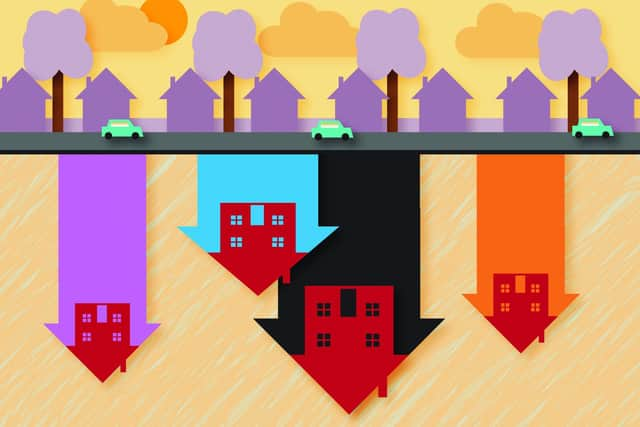Kirsty McLuckie: Owing more on a mortgage than your property is worth will soon be a reality for some
It has not been much of a worry in the last few years, with property prices booming. But if values do fall considerably over the next few months, owing more on a mortgage than your property is worth will soon be a reality for some.
Predictions for the future of house prices vary, but most agree that a “softening” or “correction” is coming to the market – estate agency-speak for a fall.
Advertisement
Hide AdAdvertisement
Hide AdFigures from the Bank of England published this week show mortgage approvals in October were down considerably.


And as well as the rises in the cost of borrowing causing buyers to think again, rental legislation is prompting landlords to exit the market, depressing values of former rental properties.
Which may be good news for those looking to buy, perhaps not so great for those who already have.
But for most owners, peaks and troughs in the average values of properties are of little concern. And averages are just that – while a bust in one part of the country may skew the overall picture, it will have less direct effect on your place.
If you have owned a property for a while, you are also likely to be quids-in rather than looking at a loss.
In just the year to September, prices in the UK went up by nearly 10 per cent, and they’ve have been rising every year of the last decade or so. So price falls over the next two years will still leave most with added equity we haven’t earned.
But some might still fall into negative equity – buyers on a maximum 95 per cent mortgage are at risk, particularly if they have bought a brand-new property, as these tend to attract a premium.
Having to sell shortly after you bought can be another risk factor and for some timing is not a choice –such as in the cases of relationship breakdown, financial difficulties or a sudden job relocation.
Advertisement
Hide AdAdvertisement
Hide AdThose most affected may not be able to move house at all as the price they get will not pay off the mortgage, so the mortgage provider can block the sale.
Paying down the balance of your mortgage will help, as might increasing the value of the property with upgrades, although both of these moves require funds.
But even if you don’t want to move, being in negative equity will cause problems for a remortgage. Some 55 per cent of homeowners will come to the end of their fixed term deal within three years, according to Comparethemarket.
With interest rates up, remortgaging to the best deal is more important than ever, but it is impossible to move to another lender while in negative equity – currently you need an absolute minimum of 5 per cent in equity.
If you do find yourself owing more than your property is worth with a mortgage deal ending, your current lender is likely to offer a new deal, and it is usually better than their standard variable rate.
While the options may not be available on the open market, most lenders will look to support customers who have demonstrated a good record of payment.
If you can agree a sustainable payment, the solution will then be just to sit it out until your loan-to-value – or the market – improves.
- Kirsty McLuckie is property editor at The Scotsman